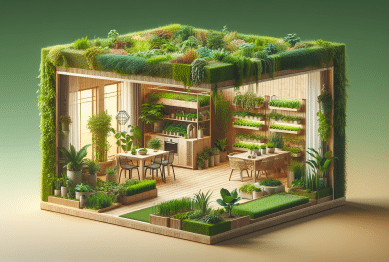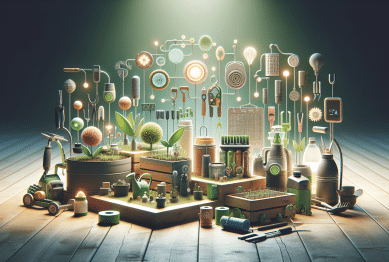In an era where sustainability is essential, many homeowners are seeking ways to reduce their carbon footprint and embrace eco-friendly practices. If you’re looking to make impactful changes in your living space, eco-friendly home upgrades offer simple yet effective solutions that can benefit both your home and the planet. This guide explores these upgrades, showcasing how small changes can lead to significant results. From installing energy-efficient appliances to incorporating smart thermostats, homeowners can drastically reduce energy consumption while lowering utility bills. Opting for sustainable building materials, such as bamboo flooring or recycled countertops, also helps minimize environmental impact during renovations. Additionally, integrating solar panels or rainwater harvesting systems can further enhance the home’s sustainability, allowing homeowners to generate clean energy and conserve natural resources for long-term benefits.

The Importance of Eco-Friendly Upgrades
The urgency for sustainable living has never been clearer. A report by the United Nations highlights that climate change poses significant risks to our environment and health (UN, 2023). By making eco-friendly home upgrades, you not only contribute to a healthier planet but also improve your living conditions and save money over time. Sustainable home upgrades, such as improved insulation and energy-efficient windows, can drastically reduce energy waste, leading to lower heating and cooling costs. Moreover, eco-friendly homes tend to have better air quality due to the use of non-toxic materials and proper ventilation systems, promoting better health for residents. As governments increasingly offer incentives for green building practices, homeowners who invest in sustainability now may also benefit from tax breaks and increased property value in the future.
Benefits of Eco-Friendly Home Upgrades
- Cost Savings: Many eco-friendly choices lead to reduced utility bills.
- Healthier Environment: Sustainable materials can enhance indoor air quality.
- Increased Home Value: Energy-efficient homes are increasingly appealing to buyers.
Simple Eco-Friendly Home Upgrades
1. Switch to Energy-Efficient Lighting
Overview: One of the simplest eco-friendly home upgrades is replacing incandescent bulbs with LED lighting.
Benefits:
- LEDs consume up to 75% less energy and last significantly longer.
- They are available in various styles to fit any décor.
Tip: Opt for smart LED bulbs that you can control through a mobile app for added convenience.
2. Install Low-Flow Fixtures
Overview: Low-flow faucets, showerheads, and toilets can dramatically reduce water consumption.
Benefits:
- These fixtures can save 30-50% more water compared to standard options.
- They help lower your water bills while maintaining performance.
Tip: Look for products with the WaterSense label to ensure efficiency.
3. Use Sustainable Materials for Renovations
Overview: When renovating, consider using sustainable materials like bamboo flooring or recycled glass countertops.
Benefits:
- Bamboo is a renewable resource, while recycled materials help reduce waste.
- Sustainable materials often have a lower carbon footprint.
Tip: Check with local suppliers for eco-friendly options to support your community.
4. Upgrade to Energy-Efficient Appliances
Overview: Replacing outdated appliances with ENERGY STAR-rated models is a significant eco-friendly home upgrade.
Benefits:
- Energy-efficient appliances can use 10-50% less energy than standard ones.
- Many local utilities offer rebates for energy-efficient upgrades.
Tip: Prioritize high-use appliances such as refrigerators, washing machines, and dishwashers.
5. Insulate Your Home
Overview: Proper insulation is crucial for maintaining a comfortable home while reducing energy usage.
Benefits:
- Good insulation keeps your home warmer in winter and cooler in summer.
- It can lead to substantial savings on heating and cooling costs.
Tip: Focus on areas like attics, basements, and crawl spaces to maximize effectiveness.
6. Create a Composting System
Overview: Composting organic waste helps reduce landfill contributions and creates nutrient-rich soil for your garden.
Benefits:
- Composting lowers methane emissions from landfills.
- It provides a natural alternative to chemical fertilizers.
Tip: Start small with a kitchen compost bin, and expand as you get comfortable with the process.
7. Switch to Natural Cleaning Products
Overview: Many conventional cleaning products contain harmful chemicals that can affect indoor air quality.
Benefits:
- Natural cleaners are often just as effective and healthier for you and your pets.
- They contribute to a more sustainable lifestyle.
Tip: Create your own cleaners using vinegar, baking soda, and essential oils for an eco-friendly alternative.
Making Your Home Eco-Friendly: Final Thoughts
Incorporating eco-friendly home upgrades into your living space doesn’t have to be overwhelming. In fact, it can be a gradual process that starts with simple, easy-to-implement swaps that can make a noticeable difference. For example, replacing traditional incandescent light bulbs with energy-efficient LED lights is an affordable and straightforward change that reduces energy consumption and cuts down on electricity bills. Likewise, opting for eco-friendly materials, such as low-VOC paints or reclaimed wood, not only benefits the environment but also enhances the aesthetic and air quality of your home.
These small changes add up over time, helping reduce your household’s overall carbon footprint while making your living space more efficient and comfortable. Additionally, investing in energy-efficient appliances, water-saving fixtures, or even smart home systems can automate your sustainability efforts, leading to long-term savings. Whether it’s through insulating your home better or installing a programmable thermostat, these upgrades offer both immediate and future benefits.
As we face the growing impacts of climate change, embracing eco-friendly practices in our homes is more critical than ever. Not only do these practices contribute to a healthier planet, but they also create a more enjoyable and cost-effective living environment for you and your family. By making mindful choices in our home design and functionality, we play a role in fostering sustainability while also reaping the rewards of a more energy-efficient lifestyle. Together, these small steps can make a big impact on our environment and help pave the way for a greener future.
References
- United Nations. (2023). Climate Change and its Impact on Human Health. Read More
- U.S. Environmental Protection Agency. (2023). WaterSense: Saving Water in Your Home. Read More
- U.S. Department of Energy. (2023). Energy Saver: Energy Efficiency at Home. Read More
- Green Building Council. (2023). Sustainable Materials: Making the Right Choices. Read More
- The Composting Council. (2023). Benefits of Composting. Read More









